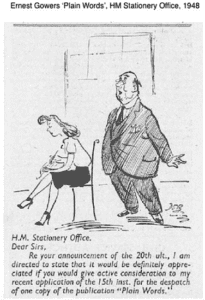JMS Pearce
Hull, England
 |
| Fig 1: Comic featuring Plain Words |
The great essayist and philosopher Francis Bacon (1561-1626) once said: “Words, when written, crystallize history; their very structure gives permanence to the unchangeable past.”
I suggest that the problems posed by writers who fail to convey meaning are not new.1,2 As long ago as 1713 the Scriblerus Club was founded to ridicule pretentious erudition and jargon. In 1951 His Majesty’s Stationery Office published a booklet entitled A.B.C. of Plain Words (Fig 1) by Sir Ernest Gowers, son of the esteemed neurologist Sir William Gowers. It was characterized by elegance, wit, and good sense: a corrective of jargon and oficialese prevalent in the Civil Service. Within a year it was a bestseller. Subsequent revisions led to The Complete Plain Words published in 1954.
Despite this and many other texts about good writing, a huge weight of verbal garbage still clogs many articles; in saying this I may be fairly accused of tedious didacticism. Few modern medical publications are devoid of long-winded phraseology, needless abstraction, passive rather than active phrases, and jargon that convey little clarity and even less understanding. These sins of writing are not confined to medicine.
It is more difficult to ponder and craft the right word or phrase than to trot out a hackneyed, less precise version. One respected reviewer said that many writers seem to cherish a ritual verbiage as a kind of uniform. However, changes in idiom and style evolve and are necessary. Scientific and medical writers should embrace such change, but they have an extra obligation to the reader to remain accurate and understandable. If you cannot explain something simply, you probably do not understand it. Byron noted that words promote thinking:
“But words are things, and a small drop of ink
Falling like dew upon a thought, produces
That which makes thousands, perhaps millions, think.”
Dr. Phil Hammond, a reliable source of medical wisdom gave an example of what he amusingly called “wonk”:
Of all the examples of NHS ‘wonk’ I’ve collected over the years, my favorite is this advertisement: “Applications are invited to become a Blue Sky Practitioner reporting to the Blue Sky Lead in the New NHS Modernisation Agency. The workstreams will work to a generic cycle based on a hypothesis driven, creative problem-solving process to create improvement products . . . You will undertake horizon scanning and futures research . . . creating curve leverage systems for rapid diffusion . . .”3
He was referring to the prevailing pandemic of medical gobbledygook, which is pretentious, long-winded gibberish, or so specialized that it obscures the meaning of writing by careless use of both words and grammar.
Jargon
Examples of jargon are too numerous to justify detailed repetition. The use of Latin and Greek words such as dyspepsia, dyspnea, menorrhagia, aphasia, and paraplegia at one time served to hide a serious condition from patients to save them undue worry. But they are also a shorthand (though not always that short) by which doctors communicate with each other. This jargon applies to many areas of expertise and if used sparingly, with consideration for the reader, has a limited value.
However, some argue that certain documents must be written in jargon to conform to supposed house rules or standards. This is a misguided recipe for laziness without logic or other justifiable basis. This type of medical English is too often understandable only to the writer and to a few in his or her specialty. Why should we be forced to read texts written in such language? Why should they not be easy to understand? 4
Acronyms
Acronyms, though useful abbreviations within the confined circles of a particular specialty, often litter passages where they are both unsightly and meaningless to the informed but less specialized reader.5
 |
| Fig 2: George Orwell in BBC 1940. Via Wikimedia |
Overworked words and abbreviations
Some words and phrases in their generality evade an exact statement; they are overworked and best avoided. The elimination of simple verbs such as break, stop, spoil, mend, or kill, frequently becomes a phrase that employs some general-purpose verb such as prove, serve, form, play, or render.6 Pretentious diction replaces simple statements. (Fig 1)
The New England Journal of Medicine (NEJM) editors showed unease with abbreviations and acronyms as long ago as 1966:
Anything that hinders communication of ideas defeats the purpose for which a medical article has been written. The failure in communication may be due to any one of a number of flaws. . . . Ambiguous symbols and abbreviations that defy comprehension. . . . Authors should be encouraged to realize that their mission is to reach a large readership by a clear and simple presentation of their investigative result.7
Eric Blair, a.k.a. George Orwell (1903-1950), (Fig 2) said that much of modern writing “consists in gumming together long strips of words which have already been set in order by someone else, and making the results presentable by sheer humbug.” The attraction of this way of writing is that it is easy. It is easier to say: “In my opinion it is a not unjustifiable assumption that” than to say “I think.”6
It requires thought and assiduous self-criticism if meaning is to be plain.
My words fly up. My thoughts remain below;
Words without thoughts never to heaven go.
We could all gather our “favorite” list of well-worn and ill-chosen words, abbreviations, and phrases.1 Many used in genetics are as confusing as they are ungainly and portentous, devoid of clear explanation and meaning to the average reader. To paraphrase Orwell, such “dying metaphors” as melting pot, acid test, mental issues, fruitful conceptual framework, proactive approach, routine testing, global healthcare system, “or other lumps of verbal refuse could be sent into the dustbin where they belong.”
Psychobabble
Psychobabble is another prevalent plague: that form of speech or writing that uses psychological jargon, buzzwords, and esoteric language to create an impression of truth or plausibility. It often hides the fact that the writer fails to understand the proper use of psychological terms. Words, like Nature, half reveal and half conceal the Soul within, said Tennyson, In Memoriam. Often psychobabble muddies the water (another cliché!) to make it seem deep.
Plain English
The failure to write clearly and intelligibly led to several campaigning organizations such as the Plain English Campaign, which has spent many years fighting “gobbledygook, jargon and misleading public information.”8
Though some dispute Orwell’s rules,9 perhaps we should try to heed the essential wisdom of his qualified advice,6 which can be applied with benefit to medical and scientific articles.
(i) Never use a metaphor, simile, or other figure of speech which you are used to seeing in print.
(ii) Never use a long word where a short one will do.
(iii) If it is possible to cut out a word, always cut it out.
(iv) Never use the passive where you can use the active.
(v) Never use a foreign phrase, a scientific word, or a jargon word if you can think of an everyday English equivalent.
(vi) Break any of these rules sooner than say anything outright barbarous.
Of course to write plainly and economically should not always apply to more discursive, artistic literature and poetry where more subtle metaphors and rhetorical devices can improve the elegance and the art of using words.10 The good writer considers the effects of his language on the reader. In scientific papers and texts, plain language has much to commend it if we want readers to take an interest in and understand what we say.
Reference
- Isaacs B. Plain words. British Medical Journal 1951;2:1032-3.
- Todd JW. Plain words in Medicine. Lancet 1964;
- Hammond P. Public Health Today. June 2015; 19
- Gilliver S. Plain language and readability. Medical Writing 2015;24 (1):1-2.
- Pearce JMS. Observations on Acronyms. Hektoen Int Journal Summer, 2015
- Orwell G. Politics and the English Language. Horizon. London. 1946
- O’Leary R. Technic of medical communication. N Engl J Med 1966;274:940–944.
- About us. Plain English Campaign; 2014 [cited 2014 Dec 12]. Available from: http://www.plainenglish.co. uk/about-us.html.
- Moran J. First You Write a Sentence: The Elements of Reading, Writing … and Life. Viking 2018.
- Forsyth M. The elements of eloquence. How to turn the perfect English phrase. London, Icon Books. 2016.
JMS PEARCE, MD, FRCP, is an Emeritus Consultant Neurologist Department of Neurology, Hull Royal Infirmary, and an author with a particular interest in the history of science and medicine.
Fall 2020 | Sections | Literary Essays

Leave a Reply